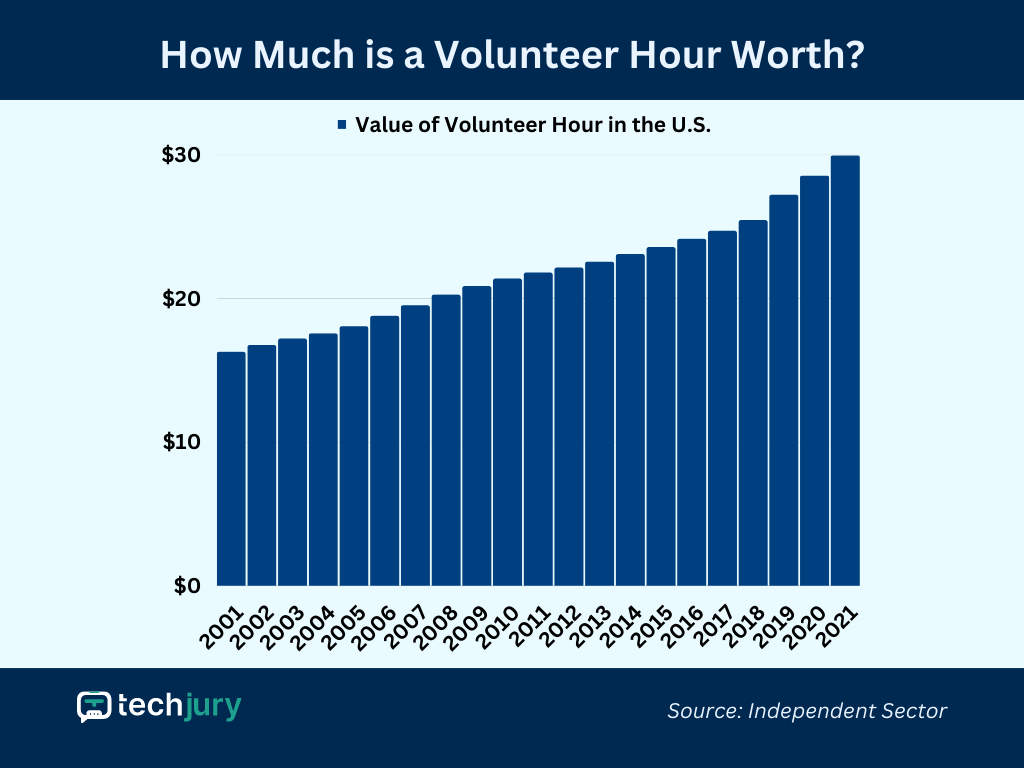

Updated · Jan 10, 2024
Updated · Jan 02, 2024
Harsha Kiran is the founder and innovator of Techjury.net. He started it as a personal passion proje... | See full bio
Lorie is an English Language and Literature graduate passionate about writing, research, and learnin... | See full bio
Every year, millions of Americans dedicate their spare time to helping others. Today, we present a host of volunteering statistics that will shine a light on these people.
As well as bringing you general facts about volunteering, we’ll also showcase some corporate stats, data involving youth volunteering, and volunteer benefits statistics. So, settle in and get ready to learn some exciting details!
(Independent Sector)
The cost of a volunteer hour was $27.20 in 2019, up from $25.43 in 2018.

(Independent Sector)
Massachusetts and California rank second and third for the hourly cost of volunteering at $36.38 and $35.56, respectively.
In the table below represented 10 states with highest average hour value:
| State | Average Hour Value |
| District of Columbia | $50.48 |
| Massachusetts | $36.38 |
| California | $35.56 |
| Washington | $34.87 |
| New York | $34.59 |
| Connecticut | $33.35 |
| Maryland | $32.82 |
| New Jersey | $32.39 |
We’ll kickstart our volunteering statistics with a few general stats:
(Nonprofits Source)
This equates to a national volunteer rate of 25% of the adult population, meaning one in four people you meet is likely to volunteer in some way, shape, or form.
(Americorps)
It’s relatively close, but the stats on people volunteering indicates that women are more active than their male counterparts. Men have a 26.5% volunteer rate, while women sit at 33.8%.
(Nonprofits Source)
The volunteering facts indicate that most people volunteer for religious organizations. Just over a third of volunteers will spend their time at religious organizations.
(Americorps)
This means that one in two people will volunteer in Utah per year. On the other end of the scale, volunteer statistics by state show that Florida comes in last with a 22.8% volunteer rate.
(Americorps)
Generation X and Baby Boomers dominate volunteerism in America. 36.4% of Gen X Americans are volunteers, with 30.7% of Baby Boomers also donating their time and talents each year.
(Statista)
A worrying fact is that volunteering has continued to decline over the last few years. The most recent data looked at trends from 2008 to 2017, showing a decline from 26.5% to 25.1%. There has not been another survey showing if things have improved since then, but experts are hopeful that there has been a growth.
(Volunteer Hub)
This means that every person who volunteers in the US will contribute at least two days' worth of their time to helping those in need - for free! The average volunteer hours per week add up to just under an hour.
(Census.gov)
To put the previous volunteering time stat into context, people dedicate 7 billion hours to supporting communities and nonprofits.
(Initlive)
Over two-thirds of volunteers will start their journey online, using Google and other search engines to find new opportunities.
This next section focuses on corporate stats with crucial findings relating to US nonprofits and other organizations.
(Volunteer Hub)
This number had been growing for many years, but the pandemic stopped growth and could mean that this figure will decline during the following years.
(Independent Sector)
Unfortunately, many nonprofit volunteer organizations will have to close permanently due to the pandemic.
(Nonprofits Source)
Considering the number of hours dedicated by a nonprofit volunteer each year, along with all the different types of people volunteering, volunteers' financial value estimates at around $193 billion per year.
(Deloitte)
Interestingly, even if they don’t volunteer themselves, many millennials prefer working at corporations with active roles within the community. This is one of the most telling community service facts as it demonstrates the want for businesses to be more involved in volunteerism and their communities for the greater good.
(Nonprofits Source)
By comparison, the numbers of volunteers involved with two organizations are only 18.3%, showing that most people don’t or can’t volunteer at multiple places.
When it comes to the younger generations, what is their approach to volunteering? We’ve uncovered a few eye-opening youth volunteerism statistics from around the US.
(Optimist.org)
This staggering stat about volunteering in America caught most by surprise. Over half of the people aged between 12 and 19 are volunteers. This is nearly double the rate of the adult population.
(Optimist.org)
The most common way for young people to volunteer is through schools and school-based groups. Another one of the interesting youth volunteer facts is that 12% choose to volunteer through external organizations in the community.
(Zippia)
Statistics show that women are more active volunteers than men. When looking at the younger generation, this is further indicative. 56.1% of youth volunteers are female, while 37.5% are male, and 6.4% are unknown.
(Americorps)
This is significantly less than the rate of volunteers among 12 to 19-year-olds, but it’s more in line with the national average. Furthermore, when looking at community service facts amongst this generation, a third of them volunteer by helping out.
The following stats bring you crucial information relating to the benefits associated with volunteering.
(Americorps)
This study looked at the elderly population, and the health benefits volunteering could bring. Being more active by partaking in volunteer work improved overall geriatric health over a five-year period. Amazing!
(BMC Public Health)
Another fascinating study produced arguably one of the most insightful volunteering stats available. People who engaged in regular volunteering saw an 8.54% increase in mental well-being and a 4.3% decrease in depression.
(United Health Group)
That’s nearly two-thirds of employees that volunteer through work, demonstrating just how beneficial it can be to improve relationships within the workplace.
(Americorps)
The statistics on volunteers who donate show that they are twice as likely to give money to charities than non-volunteers.
You have seen some of the most significant stats throughout this post. While volunteerism trends seem to be declining since 2008, the figures may rise once again, particularly post-pandemic. Which of these statistics about volunteering stood out the most to you, and why?
Most volunteers will donate an average of one hour per week, equating to 50 hours every year.
Educated people of all races and genders tend to have a higher volunteer rate than those without a college degree.
Youth between the ages of 12 and 19 are the most frequent volunteers.
According to a study by Zippia, the average age of American volunteers is 42.
Approximately 25% of the adult population volunteer each year.
Volunteering statistics put the total number of global volunteers at around 970 million.
Your email address will not be published.
Updated · Jan 10, 2024
Updated · Jan 09, 2024
Updated · Jan 05, 2024
Updated · Jan 03, 2024




